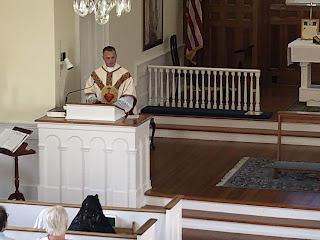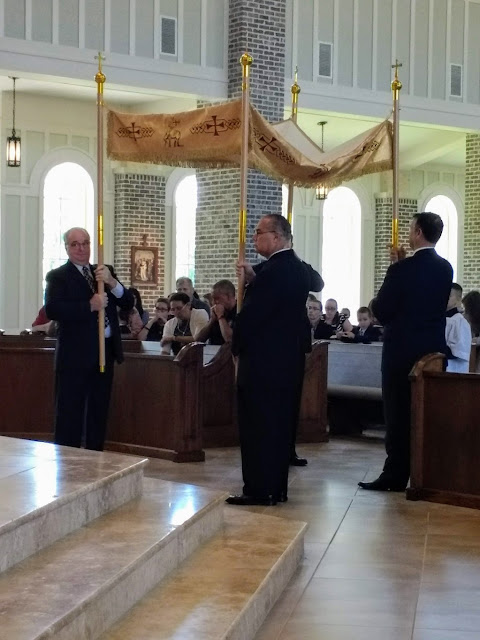With words of apostacy and hersey coming from high places and from a cardinal, is this pope now alarmed? This is from Crux:
Francis warns German Catholics they can’t just do their own thing
- Inés San Martín Jun 29, 2019
Pope
Francis poses with Cardinal Reinhard Marx of Munich-Freising and his
delegation during the pope's general audience in St. Peter's Square at
the Vatican April 19, 2917. (Credit: Paul Haring/CNS.)
ROME
- As the Catholic Church in Germany prepares to embark on a synodal
process motivated in part by a desire to stop a hemorrhage of faithful,
Pope Francis has sent them a letter reminding them they don’t walk alone
but with the universal Church.
In the missive he also reminds the Germans that a “structural” reform, simply changing to adapt to modern times, is not the solution.
The Church’s raison d’etre, Francis wrote in a letter released by the Vatican Saturday, is that God “so loved the world that he gave his only Son so that all who believe in him may not die, but may have eternal Life.”
This means that the transformation and revitalization sought after by the German Church with a synod called by the bishops’ conference, cannot simply be a “reaction to external data or demands,” including a drop in births and aging communities. Though these are “valid causes,” Francis wrote, seen outside the ecclesial mystery they could stimulate a reactionary attitude.
The pope’s letter to the Catholics of Germany comes three months after Cardinal Reinhard Marx of Munich and Freising announced that the local church was embarking on a “binding synodal process” to tackle what he says are the three key issues arising from the clerical abuse crisis: Priestly celibacy, the Church’s teaching on sexual morality, and a reduction of clerical power.
True transformation, Francis wrote, “demands a pastoral conversion.”
“We are asked for an attitude that, seeking to live and make the gospel transparent, breaks with ‘the gray pragmatism of the daily life of the Church, in which all appears to proceed normally, while in reality faith is wearing down and degenerating into small-mindedness’,” Francis argued, quoting his 2013 apostolic exhortation Evangelii Gaudium, which in turn was quoting then-Cardinal Joseph Ratzinger, today Pope emeritus Benedict XVI.
Throughout the 7-page letter Francis quotes his German predecessor often. The first time is when he diagnosed the local Church, with the “growing erosion and decay of the faith.”
This deterioration, Francis wrote, is multifaceted and doesn’t have an easy solution. The criterion par excellence, he wrote, guiding the Church and its discernment must be evangelization, since this is its “essential mission.”
Believing that solutions are purely structural, Francis argued, is “one of the first great temptations at the ecclesial level.”
“Without having the Gospel as its soul,” Francis wrote, a well-organized and even modernized ecclesial body could become a “gaseous” Christianity that has no evangelical zeal.
“Each time the ecclesial community tries to leave its problems alone and focuses exclusively on its forces or its methods, its intelligence, its will or prestige, it ends up increasing and perpetuating the evils it was trying to solve,” Francis said.
No matter how challenging the scenario, the pontiff insisted, it cannot make the Church lose sight of the fact that its mission is not based on forecasts and calculations, ecclesial and political and economic surveys, or pastoral plans.
In the end, he writes, it all comes down to God’s love for his children.
His love “allows us to raise our heads and start again, with a tenderness that never disappoints us and that can always give us back joy,” Francis writes. “Let us not flee from the resurrection of Jesus, never declare ourselves dead, no matter what happens.”
The ecclesial community, he continues, needs to ask what the Holy Spirit is saying to the Church today, recognizing the signs of the times, which does not mean to simply adapt to the spirit of the times without questioning.
Evangelization, Francis argued, is a conversion of love to the one “who loved us first,” it’s to help Christ’s passion to touch the “multiple passions and situations” where Christ continues to suffer due to sin and inequity. Among the examples of situations that make Christ suffer today, the pontiff listed modern slavery, xenophobic discourses and a culture based on indifference and individualism.
Speaking about the synodal path the German Church is about to embark on, Francis said it has to be rooted in the Holy Spirit and that it has to be a “walking together” of the entire Church, involving the laity, the religious, the clergy and the bishops.
“The synodal perspective does not cancel the antagonisms or perplexities, nor the conflicts are subordinated to syncretistic resolutions of ‘good consensus’ or resulting from the elaboration of censuses or surveys on this or that topic,” he said, urging the Germans to instead pray, do penance and participate in eucharistic adorations.
These three attitudes, he said, are “true spiritual medicines” that allow those who live them to experience what it is to be a Christian who knows he is blessed and a member of the Church of the Beatitudes.
Lastly, the Argentine pontiff also reminded the German Church that the local Church walks alongside the universal Church, and if they are separated from it they become weak and die, hence the need to keep communion alive.
Quoting one of his own country’s most famous authors, Martin Fierro, the pope wrote: “May brothers be united, because that is the first law; may they have true unity, at whatever time, because if among them they fight, those from outside will devour them.”
In this case, he said “those from outside” are one: “the father of lies and division,” the Devil, who “pushing us to look for an alleged good or an answer to a specific situation, ends up fragmenting the body of the holy faithful People of God.”
Follow Inés San Martín
In the missive he also reminds the Germans that a “structural” reform, simply changing to adapt to modern times, is not the solution.
The Church’s raison d’etre, Francis wrote in a letter released by the Vatican Saturday, is that God “so loved the world that he gave his only Son so that all who believe in him may not die, but may have eternal Life.”
This means that the transformation and revitalization sought after by the German Church with a synod called by the bishops’ conference, cannot simply be a “reaction to external data or demands,” including a drop in births and aging communities. Though these are “valid causes,” Francis wrote, seen outside the ecclesial mystery they could stimulate a reactionary attitude.
The pope’s letter to the Catholics of Germany comes three months after Cardinal Reinhard Marx of Munich and Freising announced that the local church was embarking on a “binding synodal process” to tackle what he says are the three key issues arising from the clerical abuse crisis: Priestly celibacy, the Church’s teaching on sexual morality, and a reduction of clerical power.
True transformation, Francis wrote, “demands a pastoral conversion.”
“We are asked for an attitude that, seeking to live and make the gospel transparent, breaks with ‘the gray pragmatism of the daily life of the Church, in which all appears to proceed normally, while in reality faith is wearing down and degenerating into small-mindedness’,” Francis argued, quoting his 2013 apostolic exhortation Evangelii Gaudium, which in turn was quoting then-Cardinal Joseph Ratzinger, today Pope emeritus Benedict XVI.
Throughout the 7-page letter Francis quotes his German predecessor often. The first time is when he diagnosed the local Church, with the “growing erosion and decay of the faith.”
This deterioration, Francis wrote, is multifaceted and doesn’t have an easy solution. The criterion par excellence, he wrote, guiding the Church and its discernment must be evangelization, since this is its “essential mission.”
Believing that solutions are purely structural, Francis argued, is “one of the first great temptations at the ecclesial level.”
“Without having the Gospel as its soul,” Francis wrote, a well-organized and even modernized ecclesial body could become a “gaseous” Christianity that has no evangelical zeal.
“Each time the ecclesial community tries to leave its problems alone and focuses exclusively on its forces or its methods, its intelligence, its will or prestige, it ends up increasing and perpetuating the evils it was trying to solve,” Francis said.
No matter how challenging the scenario, the pontiff insisted, it cannot make the Church lose sight of the fact that its mission is not based on forecasts and calculations, ecclesial and political and economic surveys, or pastoral plans.
In the end, he writes, it all comes down to God’s love for his children.
His love “allows us to raise our heads and start again, with a tenderness that never disappoints us and that can always give us back joy,” Francis writes. “Let us not flee from the resurrection of Jesus, never declare ourselves dead, no matter what happens.”
The ecclesial community, he continues, needs to ask what the Holy Spirit is saying to the Church today, recognizing the signs of the times, which does not mean to simply adapt to the spirit of the times without questioning.
Evangelization, Francis argued, is a conversion of love to the one “who loved us first,” it’s to help Christ’s passion to touch the “multiple passions and situations” where Christ continues to suffer due to sin and inequity. Among the examples of situations that make Christ suffer today, the pontiff listed modern slavery, xenophobic discourses and a culture based on indifference and individualism.
Speaking about the synodal path the German Church is about to embark on, Francis said it has to be rooted in the Holy Spirit and that it has to be a “walking together” of the entire Church, involving the laity, the religious, the clergy and the bishops.
“The synodal perspective does not cancel the antagonisms or perplexities, nor the conflicts are subordinated to syncretistic resolutions of ‘good consensus’ or resulting from the elaboration of censuses or surveys on this or that topic,” he said, urging the Germans to instead pray, do penance and participate in eucharistic adorations.
These three attitudes, he said, are “true spiritual medicines” that allow those who live them to experience what it is to be a Christian who knows he is blessed and a member of the Church of the Beatitudes.
Lastly, the Argentine pontiff also reminded the German Church that the local Church walks alongside the universal Church, and if they are separated from it they become weak and die, hence the need to keep communion alive.
Quoting one of his own country’s most famous authors, Martin Fierro, the pope wrote: “May brothers be united, because that is the first law; may they have true unity, at whatever time, because if among them they fight, those from outside will devour them.”
In this case, he said “those from outside” are one: “the father of lies and division,” the Devil, who “pushing us to look for an alleged good or an answer to a specific situation, ends up fragmenting the body of the holy faithful People of God.”
Follow Inés San Martín










































